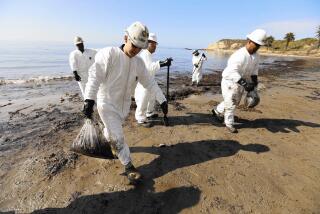Kazakhstan, Firms Study Oil Route to Turkey
- Share via
WASHINGTON — Royal Dutch/Shell, Mobil Corp., Chevron Corp. and the government of Kazakhstan agreed to undertake a study on the feasibility of dual oil and gas pipelines from Kazakhstan, through the Caspian Sea and overland to the Turkish port of Ceyhan.
The pipeline, if constructed, would serve as a central route by which landlocked Kazakhstan would move its oil and natural gas reserves to western markets.
The move, an informal endorsement of a route to Ceyhan by the three firms, puts more pressure on the 11-member Azerbaijan International Operating Co. to support construction of a pipeline to Ceyhan instead of an alternate route.
“The key point is that this is a commitment by Kazakhstan and the companies to go ahead in this direction,” said Ambassador Richard Morningstar, the U.S. State Department’s representative for Caspian energy issues.
Representatives from the companies said the cost and the length of the study have not yet been determined, though they hope to complete the initial assessment of commercial viability within the next 12 months.
The effect of the study has yet to be determined, and the companies involved said they hoped to produce a study in a “readily executable form,” said Tugrul Tosun, the vice president at Shell International Exploration & Production Ventures, who oversees the company’s role in states of the former Soviet Union.
“This subject has been studied to death,” he said.
Company representatives said the study initially would focus on a trans-Caspian pipeline from western Kazakhstan to the Azerbaijani capital of Baku.
From there, the companies expect to examine a $3.5-billion pipeline from Baku to Ceyhan, rather than a cheaper pipeline to the Georgian port of Supsa, on the Black Sea. Both options are being considered by AIOC.
“This project addresses the priority strategic objectives that Kazakhstan shares with the U.S. and our neighbors in the region to move Caspian oil and gas along an east-west corridor to western markets,” said Kazakhstan’s President Nursultan A. Nazarbayev.
The Baku-Ceyhan line is an important element of U.S. policy in the region, though the AIOC, which includes British Petroleum and Amoco Corp., has delayed a decision until early February. The decision could be pushed back further if the AIOC waits for the results of the Kazkhstan feasibility study.
“It’ll be helpful for [AIOC] to have,” said Morningstar of the study results, though he said the group could make its decision without waiting for additional study.
The U.S. has pushed for the Ceyhan route because it would send oil through Turkey, the U.S.’ only North Atlantic Treaty Organization ally in the region, and keep oil from flowing through Russia or Iran.
More to Read
Sign up for Essential California
The most important California stories and recommendations in your inbox every morning.
You may occasionally receive promotional content from the Los Angeles Times.













